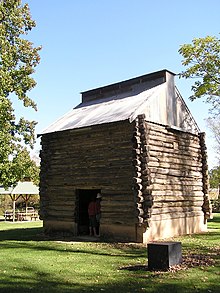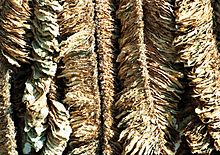Tobacco
Tobacco is a product prepared from the leaves of the tobacco plant by curing them. The plant is part of the genus Nicotiana and of the Solanaceae (nightshade) family. It is used as a drug, mostly by inhaling the smoke of, but also by using snuff or chewing. People use cigarettes, cigars, and pipe to make tobacco smoke. Tobacco contains the chemical nicotine, which causes pleasure as a stimulant drug. It also causes addiction — after people start using nicotine, it is difficult to stop. Tobacco use can cause diseases, such as many types of cancer.
| Tobacco | |
|---|---|
 Tobacco flakes, sliced from pressed plugs | |
| Product name | Tobacco |
| Source plant(s) | Nicotiana |
| Part(s) of plant | Leaf |
| Geographic origin | South America |
| Active ingredients | Nicotine, harmine |
| Uses | Recreational |
| Legal status |
|


History
changeNative Americans used tobacco before Europeans arrived in the Americas. The earliest know use of tobacco comes from nicotine residue from a pipe in the Southeastern United States. It is Radiocarbon dated at 1685-1530 BC. [2] Europeans in the Americas began to smoke and brought it back to Europe, where it became fashionable. At that time tobacco was usually smoked in a pipe. [3][4][5]
The Europeans who moved to America started to farm tobacco so that they could sell it in Europe. This became one of the main causes of the African slave trade. In 1610 a European man called John Rolfe arrived in the American state of Virginia and set up a tobacco farm which made him very rich. Rolfe was the first non-native farmer to use nicotiana tabacum, which is the type of tobacco most commonly smoked today.
In the 17th and 18th centuries tobacco made farmers very rich and towns quickly grew in the states of Virginia, North Carolina and South Carolina. In 1883 one third of United States tax money came from tobacco.
In 1864 the first American tobacco factory opened to produce 20 million cigarettes annually. By 1964 the cigarette contained over 500 added chemicals. Today tobacco manufacturers are still not required by law to list the 500+ ingredients.
Tobacco and health
changeTobacco users (especially those who inhale) and people around them (with passive inhalers) risk many very serious and often deadly illnesses, such as cancer, strokes, heart disease, and lung disease. The United States' Centers for Disease Control and Prevention describes tobacco use as "the single most important preventable risk to human health in developed countries and an important cause of premature (early) death worldwide". There are over 4800 chemicals in tobacco, including arsenic. Sixty-four of them are known to cause cancer. Smoking can also make men lose erections, and make their penises a bit smaller.[6] Tobbaco however has been used as a cure for Alzheimer's and the nicotine in tobbaco has been used to treat ADHD.[7][8]
Countries that grow tobacco
change| Top Ten Tobacco Producers - 2005 (million metric ton) | |
|---|---|
| China | 2.51 |
| Brazil | 0.88 |
| India | 0.60 |
| United States | 0.29 |
| Indonesia | 0.14 |
| Turkey | 0.14 |
| Greece | 0.12 |
| Argentina | 0.12 |
| Italy | 0.11 |
| Pakistan | 0.08 |
| World Total | 6.38 |
| Source: UN Food and Agriculture Organization (FAO)[9] | |
References
change- ↑ "Tobacco 21 - Preventing Tobacco Addiction Foundation". Tobacco 21. Retrieved 22 April 2021.
Federal Tobacco 21 is in effect
- ↑ Camody, S. et al., 2018, "Evidence of tobacco from a Late Archaic smoking tube recovered from the Flint River site in southeastern North America," Journal of Archaeological Science: Reports, 21: 904-910. https://doi.org/10.1016/j.jasrep.2018.05.013
- ↑ Tobacco: The Early History of a New World Crop Colonial National Historical Park Virginia
- ↑ Stephen Snelders Normalisation and Ambivalence: Tobacco in the Seventeenth-Century Dutch Republic, Cultural and Social History, 20:1, 11-26, DOI: 10.1080/14780038.2021.1976701
- ↑ GEORGE K. HOLMES, SOME FEATURES OF TOBACCO HISTORY. Agricultural History Society Papers, Vol. 2 (1923), pp. 385, 387-407 (22 pages) https://www.jstor.org/stable/44215783
- ↑ Verze, Paolo, et al. "The link between cigarette smoking and erectile dysfunction: a systematic review." European urology focus 1.1 (2015): 39-46.
- ↑ "Tobacco 'cure' for Alzheimer's". Mail Online. Retrieved 2023-11-08.
- ↑ "Nicotine as a drug for ADHD". www.adxs.org. Retrieved 2023-11-08.
- ↑ "FAOSTAT". UN Food & Agriculture Organisation.[permanent dead link]